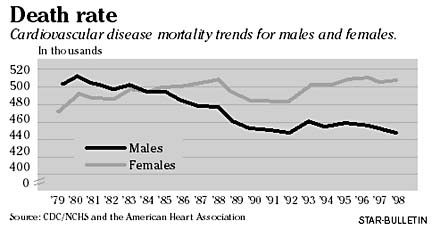
Queen’s heart center
is a blessingA ceremony dedicates the new center, which
aims for preventative cardiovascular care
Leslie Lam, who was Mrs. Hawaii and Mrs. America 2000, is wearing a pacemaker at age 38 because of cardiovascular disease.
Because of her experience and a family history of heart disease, the vivacious woman is a compelling advocate of screening for cardiovascular risk factors.
She was screened in 1999 and found at risk for heart disease after a defibrillator was implanted in her sister's heart, she said. She has had a pacemaker since August, and her father and a 14-year-old nephew were recently equipped with implanted defibrillators, she said.
Lam was among speakers at a news conference before the blessing and formal opening Thursday of the Queen's Heart Center's Outpatient Diagnostic Center.
"We're trying to get the word out that there is treatment," she said. "We're here to save lives. ... We want to shock people out there and let them know heart disease kills."
Theo Edmonds, heart center manager, said more than 800 people have received free screenings since February. Indications are that more than half have some level of cardiovascular risk, he said. "These people need to know that heart disease is preventable."
A study of more than 500 Oahu women from age 40 to 70 conducted in August revealed more than 75 percent are at risk for developing a heart attack or stroke, said cardiologist Joana Magno with Women's Heart Advantage, a Queen's education and referral program.
Yet the study, the first of its kind in Hawaii, found fewer than 25 percent of the women are doing anything to prevent the life-threatening disease, she said.
Most are not aware that cardiovascular disease is the No. 1 killer of women, she said. They think the biggest threat is breast cancer, but "10 times as many women (43 percent) die of heart disease, compared to breast cancer (4 percent)," she said.
Cardiovascular disease not only includes heart attacks, but hypertension, congestive heart failure, stroke, peripheral vascular disease and other heart, lung and blood vessel problems.
Leading risk factors are smoking, high blood pressure and cholesterol, diabetes, obesity, lack of physical activity, high levels of stress and alcohol intake, a family history of heart disease and estrogen deficiency.
People with two or more risk factors are urged to call Queen's at 547-4438 and make an appointment for a free heart risk assessment.
Based on the study, Magno said an estimated 150,000 Hawaii women are at risk of developing cardiovascular disease, which many can prevent with screening and a healthy lifestyle. "If you go out on the streets and see all these young women smoking, they are developing heart disease with every cigarette they have."
Death rates for women from heart disease are growing, while those for men have been dropping, Magno noted. Men are benefiting from preventative medicine and treatment, but women are not getting the message that heart disease is preventable, Magno said.
The Women's Heart Advantage is part of a nationwide program to get that message out. The Heart Center also has redesigned its program to provide free screening, one-stop registration and "a healing atmosphere," Edmonds said.
Lam said her grandmother and eight aunts died of heart disease in their 40s, although the cause was not known then.
She had signs of cardiovascular problems for about 13 years, tiring easily and feeling dizzy and faint, she said. She ignored them to take care of her family first but said, "If we love our family ... we have to take care of ourselves first."
